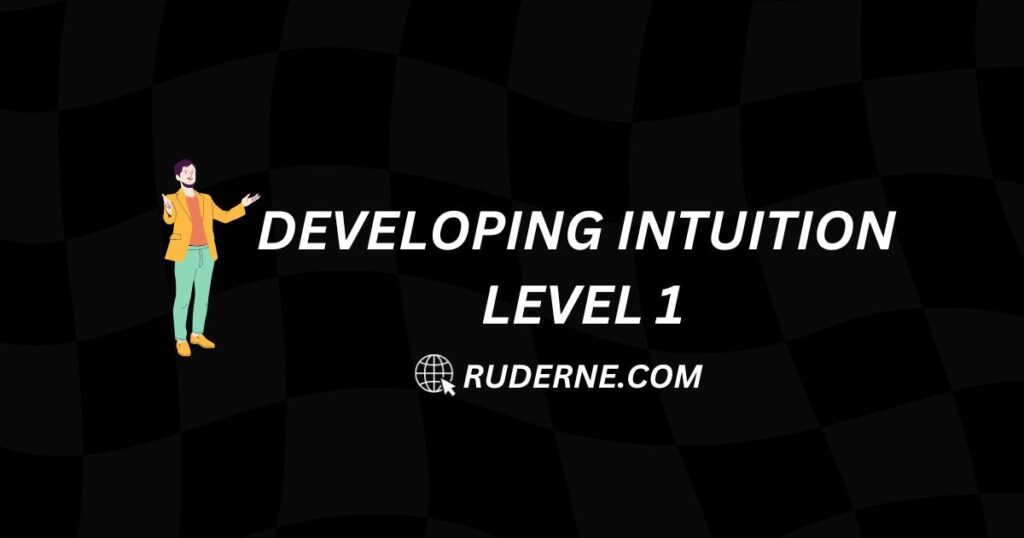developing intuition level 1 is like your inner compass—those gut feelings or instincts that guide your decisions without needing logical reasoning. It’s a skill that can make life smoother, from deciding on career moves to understanding people better.
The Science Behind Intuition
Contrary to myths, intuition isn’t magical. It’s a product of your subconscious mind analyzing patterns and past experiences. This process happens so quickly that it feels instantaneous, but it’s deeply rooted in your brain’s memory system.
Benefits of Developing Intuition
Developing intuition isn’t just for psychics. It sharpens your decision-making, helps you navigate uncertainty, and fosters creativity. Imagine making quicker, more confident choices in your personal and professional life.
Who Can Develop Intuition?
Good news—anyone can develop their intuition. It’s not an exclusive gift but rather a skill that improves with practice and awareness.
How to Begin Developing Intuition: Level 1 Basics
Getting started with intuition requires building awareness and trust in your inner voice. Here’s how to start:
Practice Mindfulness Daily
Mindfulness clears mental clutter, making space for your intuition to emerge. Dedicate at least 10 minutes a day to focus on your breath, observe your surroundings, and stay present.
Trust Your Gut Feelings
How often do you second-guess yourself? The first step to honing intuition is to stop ignoring those gut feelings. Start small—trust your instincts about simple decisions like choosing a restaurant or taking a route home.
Pay Attention to Patterns
Intuition thrives on recognizing patterns. Observe recurring themes in your thoughts, dreams, or even life events. Writing them down in a journal can help you uncover hidden insights.
Embrace Solitude
Quiet moments with yourself allow intuitive thoughts to surface. Spend time alone, free from distractions like social media, to better tune in to your inner guidance.
Engage in Creative Activities
Creative hobbies like painting, writing, or music stimulate the right brain, which is closely linked to intuition. Even doodling can open up intuitive channels!
Listen to Your Body’s Signals
Your body often reacts before your mind catches up. Pay attention to physical sensations like a tight chest, butterflies, or an uneasy stomach—they might be your intuition speaking.
Meditate for Intuitive Clarity
Meditation goes beyond relaxation; it strengthens your connection to your inner self. Guided meditations focused on intuition can help you access deeper insights.
Write Morning Pages
This practice involves writing three pages of free-flowing thoughts each morning. It clears mental noise and allows intuitive ideas to surface naturally.
Limit Overthinking
Overanalyzing is the enemy of intuition. Learn to differentiate between your intuitive voice and the constant chatter of your rational mind.
Trust the Process
Developing intuition isn’t instant. It’s like building muscle—you need consistent effort and patience. Celebrate small wins as you progress.
Common Challenges When Developing Intuition
Expect a few bumps along the way, like self-doubt or fear of being wrong. These are normal and part of the growth process.
How to Overcome Self-Doubt
To overcome self-doubt, practice affirmations like, “I trust my intuition,” or revisit past instances when your intuition proved right.
The Role of Dreams in Intuition
Dreams often provide clues from your subconscious. Keep a dream journal and note recurring symbols or emotions—they might reveal intuitive insights.
Seeking Guidance Without Dependence
It’s okay to seek advice but remember to rely on your own judgment. Intuition grows stronger when you take ownership of your choices.
Maintaining an Open Mind
Intuition flourishes in an open, curious mindset. Avoid rigid thinking and be willing to explore new ideas or perspectives.
Balancing Intuition and Logic
Intuition and logic aren’t enemies—they complement each other. Use intuition as a guide and logic as a validator to make well-rounded decisions.
Examples of Intuition in Daily Life
Think about times when you just knew something without concrete evidence. Maybe you sensed someone’s mood or avoided a bad situation. Reflecting on these moments reinforces your trust in intuition.
How Nature Enhances Intuition
Nature has a calming effect that strengthens intuition. Spend time outdoors, listen to birdsong, or walk barefoot on grass to feel more grounded and connected.
The Role of Gratitude in Intuition
Gratitude amplifies positive energy, clearing the path for intuition. Practice gratitude by listing three things you’re thankful for daily.
Celebrate Your Intuitive Wins
Whenever your intuition leads you right, celebrate it. Acknowledge those moments as proof of your progress, and you’ll build confidence.
Conclusion
Developing intuition is a transformative journey that begins with awareness, trust, and consistent practice. By following these simple steps, you’ll unlock a deeper understanding of yourself and the world around you.
FAQs
Can intuition be scientifically explained?
Yes, it’s rooted in subconscious pattern recognition and brain activity.
How long does it take to develop intuition?
It varies per person, but regular practice can bring noticeable changes within weeks.
Is intuition always correct?
While not infallible, intuition is often accurate when honed and trusted.
Can meditation improve intuition?
Absolutely. Meditation clears mental noise, making it easier to access intuitive insights.
How do I know if it’s intuition or overthinking?
Intuition feels calm and clear, whereas overthinking is usually noisy and anxious.







